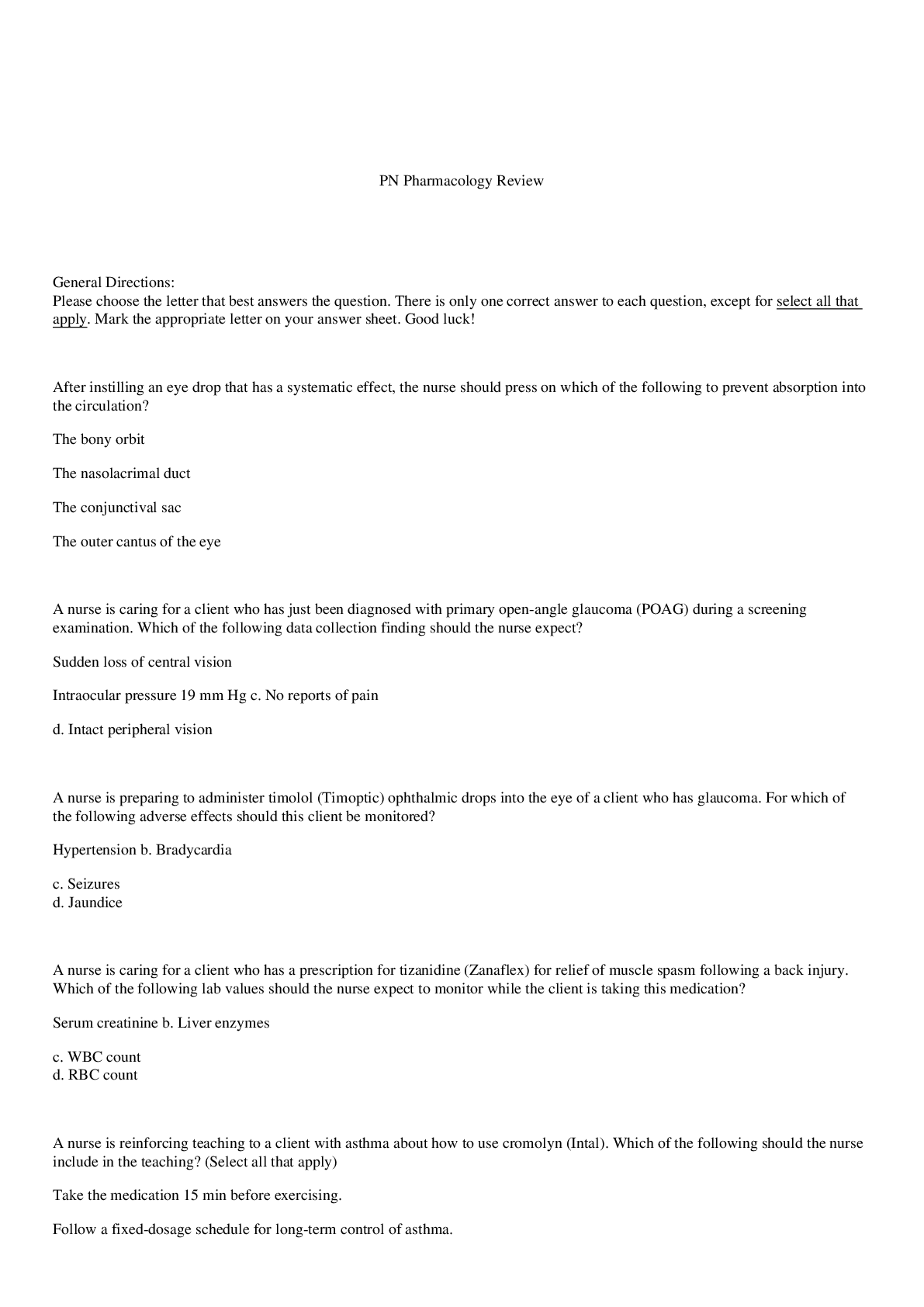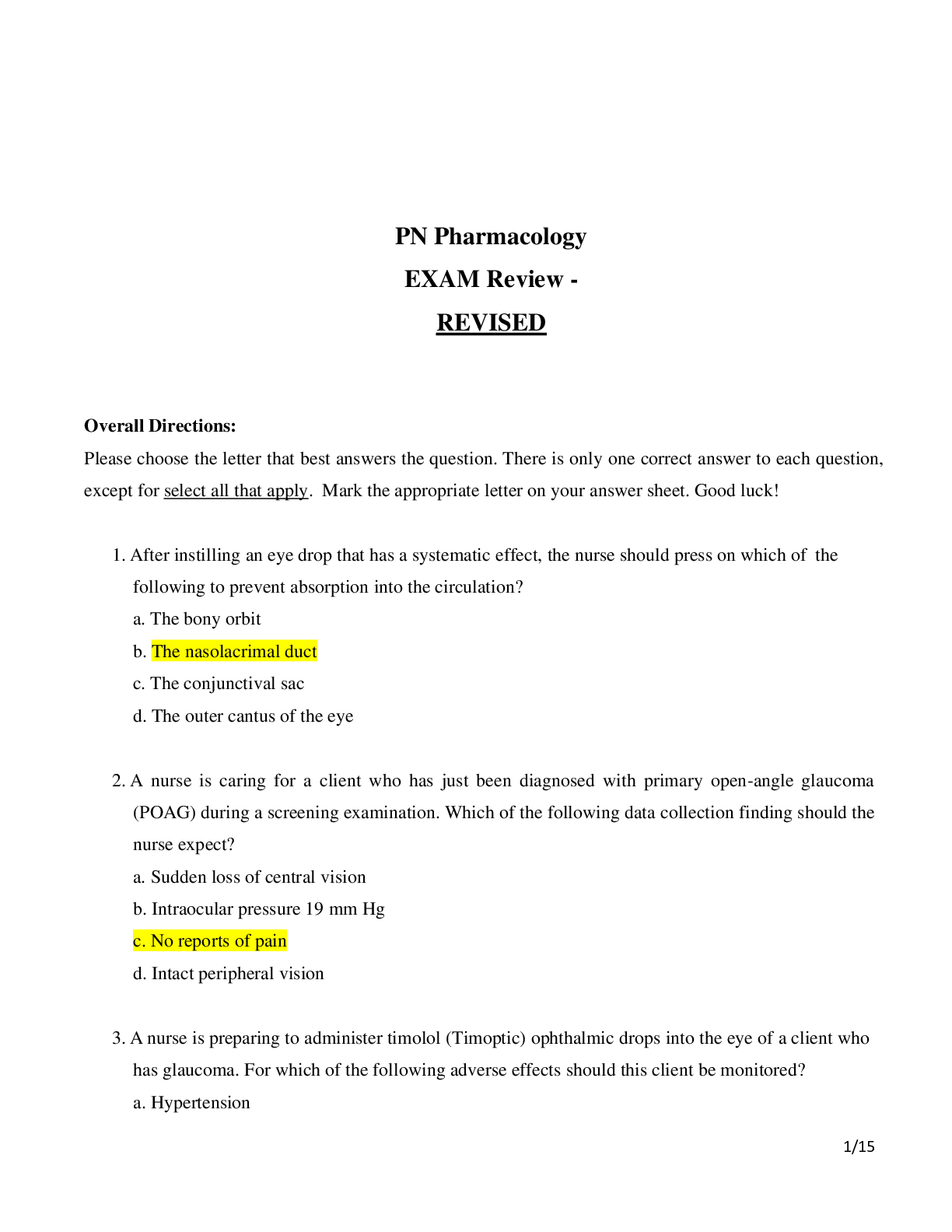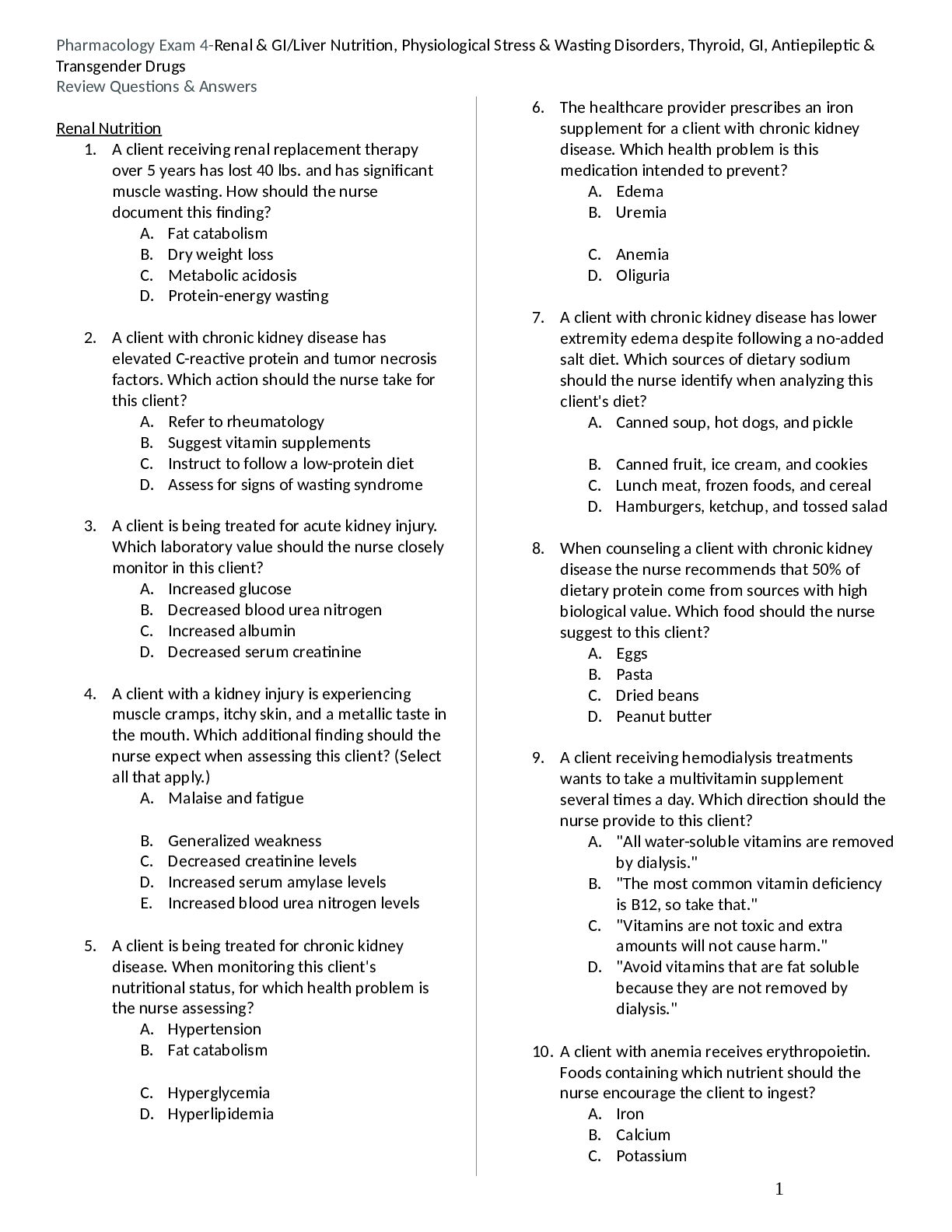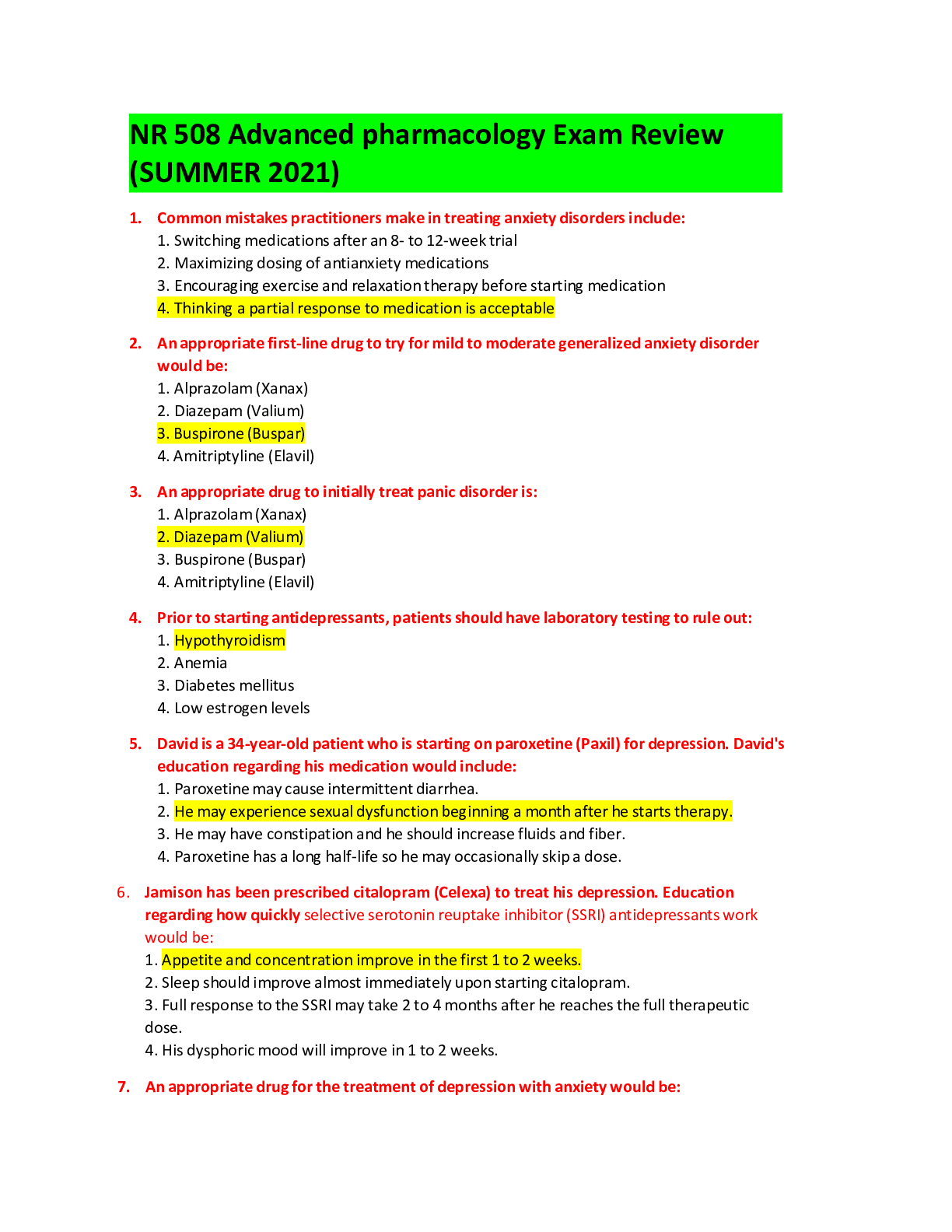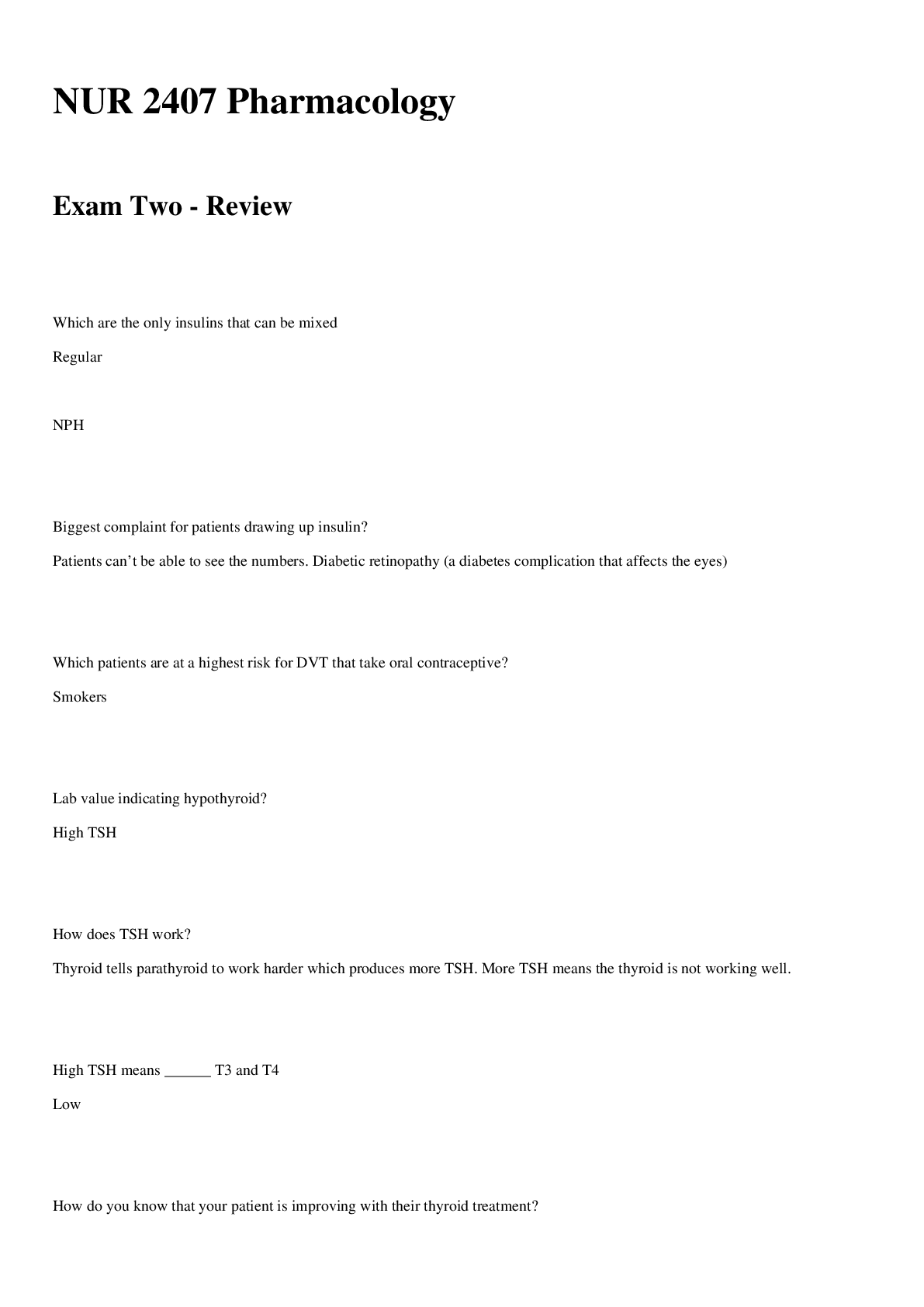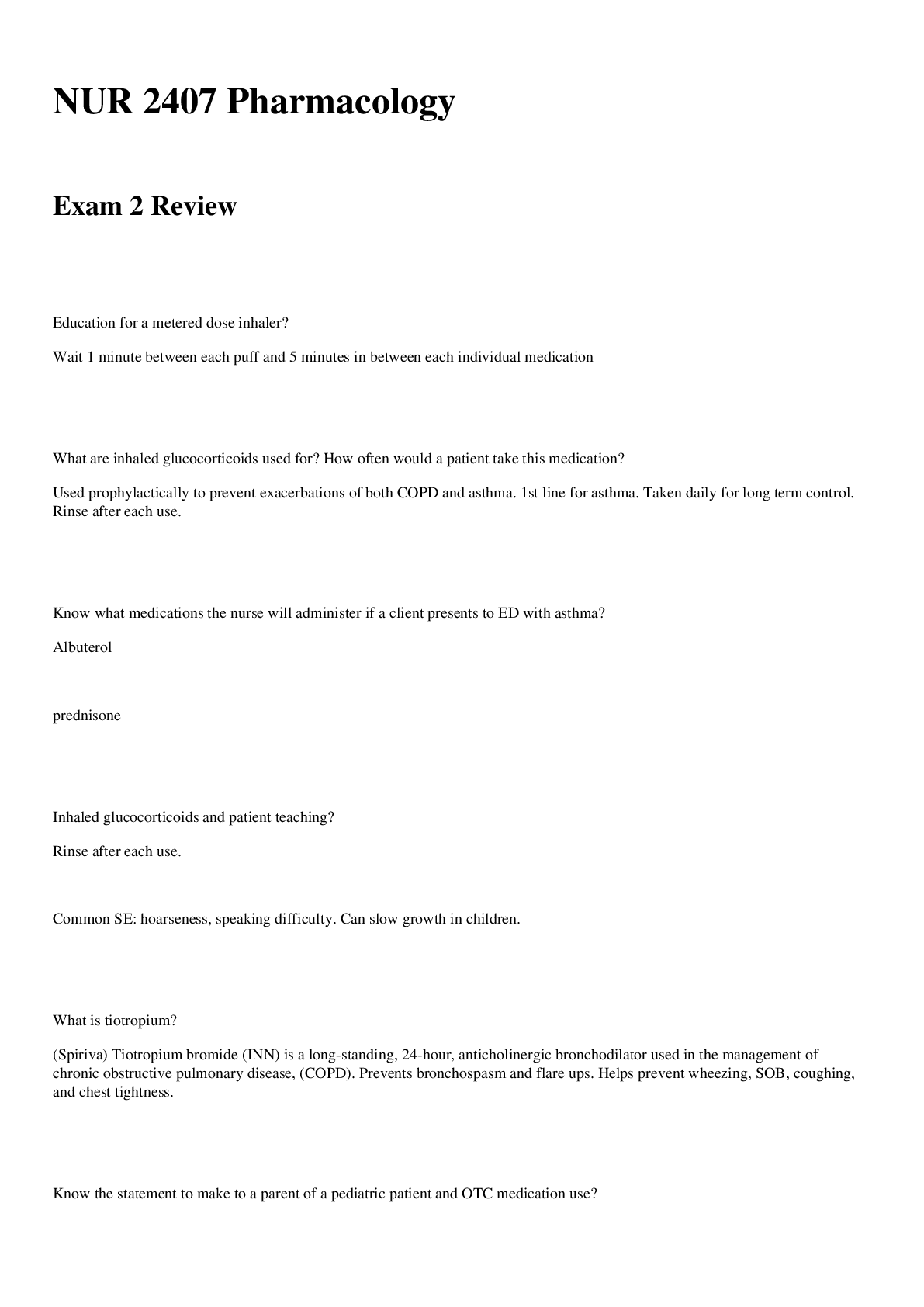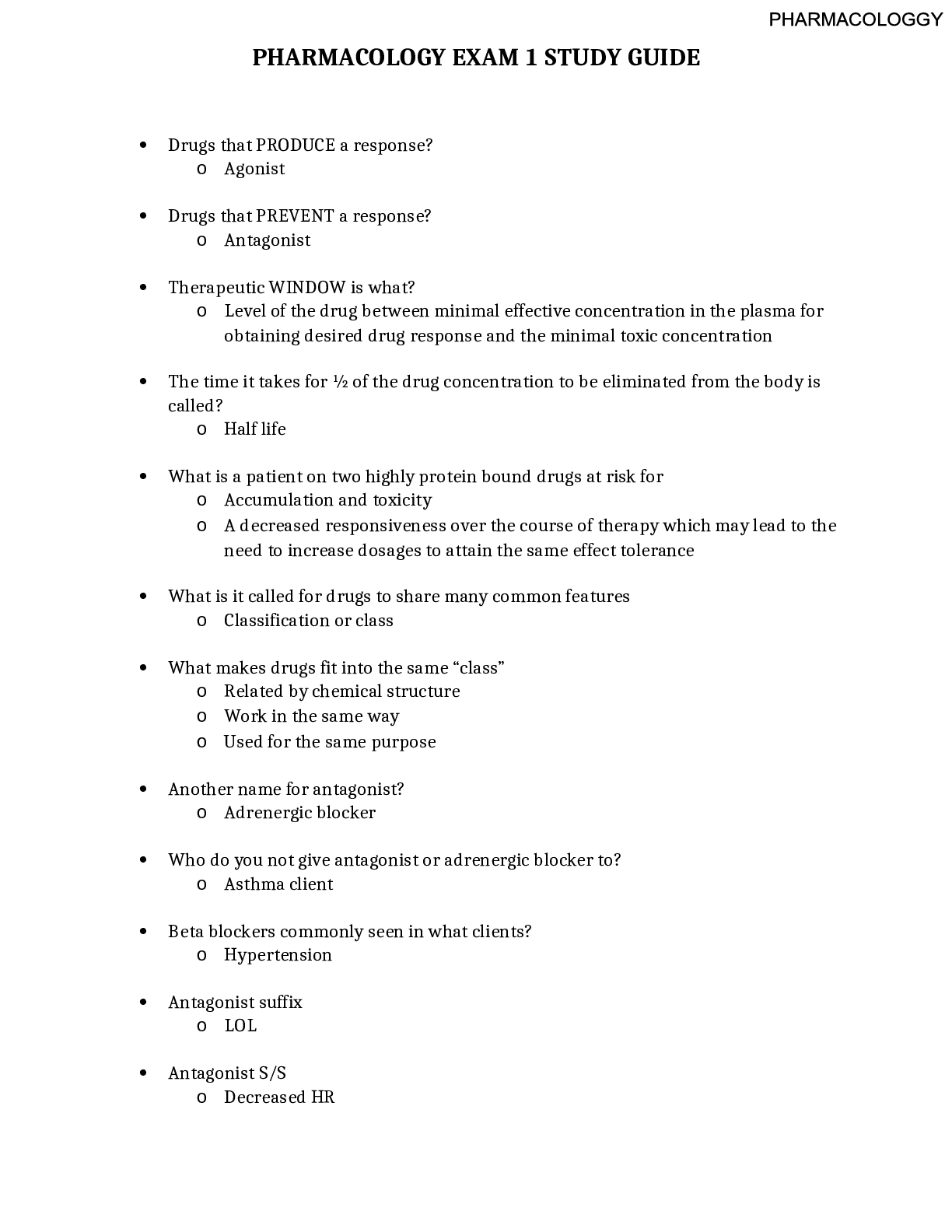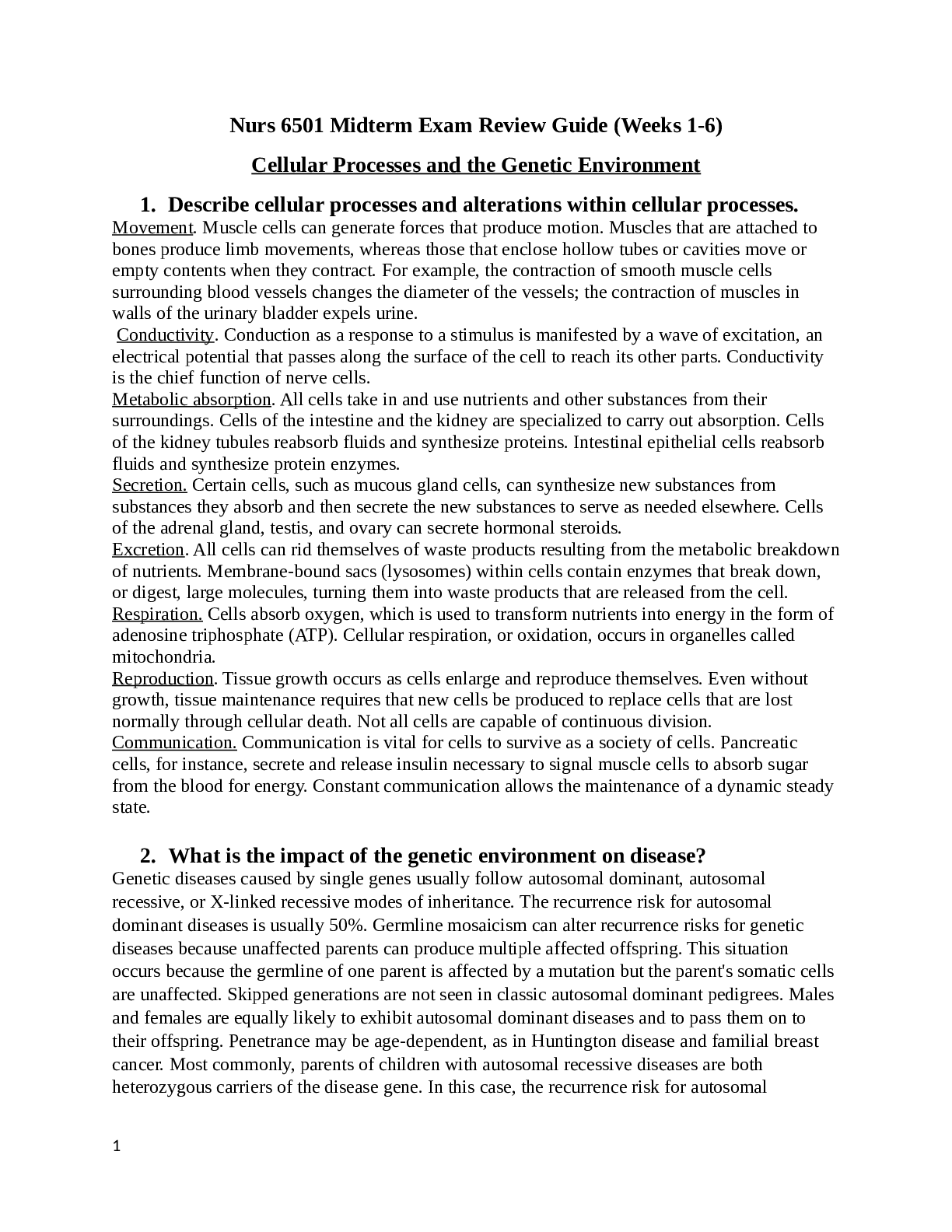*NURSING > EXAM REVIEW > ATI PN PHARMACOLOGY EXAM 2021- RETAKE GUIDE (All)
ATI PN PHARMACOLOGY EXAM 2021- RETAKE GUIDE
Document Content and Description Below
ATI PN PHARMACOLOGY EXAM 2021- RETAKE GUIDE 1. After instilling an eye drop that has a systematic effect, the nurse should press on which of the following to prevent absorption into the circulation?... a. The bony orbit b. The nasolacrimal duct c. The conjunctival sac d. The outer cantus of the eye 2. A nurse is caring for a client who has just been diagnosed with primary open-angle glaucoma (POAG) during a screening examination. Which of the following data collection finding should the nurse expect? a. Sudden loss of central vision b. Intraocular pressure 19 mm Hg c. No reports of pain d. Intact peripheral vision 3. A nurse is preparing to administer timolol (Timoptic) ophthalmic drops into the eye of a client who has glaucoma. For which of the following adverse effects should this client be monitored? a. Hypertension b. Bradycardia c. Seizures d. Jaundice 4. A nurse is caring for a client who has a prescription for tizanidine (Zanaflex) for relief of muscle spasm following a back injury. Which of the following lab values should the nurse expect to monitor while the client is taking this medication? a. Serum creatinine b. Liver enzymes c. WBC count d. RBC count 5. A nurse is reinforcing teaching to a client with asthma about how to use cromolyn (Intal). Which of the following should the nurse include in the teaching? (Select all that apply) a. Take the medication 15 min before exercising. b. Follow a fixed-dosage schedule for long-term control of asthma. c. Expect to lose weight while taking the medication. d. Observe for adverse effects such as tremors, restlessness, and palpitations. e. Do not crush or chew tablets. 6. A nurse is reinforcing teaching for a client with a prescription for a beclomethasone (QVAR) inhaler to be used for the long-term management of asthma. Which of the following dietary supplements should the client be sure to consume in sufficient amounts to prevent a deficiency while taking the QVAR inhaler? a. Iron and Protein b. Calcium and Vitamin D c. Vitamin B¹² and folic acid d. Vitamin E and K 7. A nurse is caring for a client who is prescribed oral prednisone (Deltasone) for the treatment of chronic asthma. The nurse should plan to monitor the client for which of the following findings? a. Weight loss b. Infection c. Hypoglycemia d. Angina Pain 8. A nurse is caring for a client who states she has been taking phenylephrine (Neo-Synephrine) nasal drops for the past 10 days for her upper respiratory symptoms. The nurse should plan to monitor the client for which of the following findings? a. Sedation b. Nasal congestion c. Productive cough d. Constipation 9. A nurse is caring for a preschool-age child who may have taken an overdose of diphenhydramine (Benadryl). To identify antihistamine toxicity, the nurse should plan to monitor the child for which of the following? a. Hallucinations b. Bradycardia c. Pinpoint pupils d. Pallor 10. A nurse is reinforcing teaching for a client who has hypertension and is prescribed hydrochlorothiazide (HydroDIURIL) twice daily. Which of the following instructions should the nurse include in the client’s teaching? a. “You should avoid foods high in potassium.” b. “Take the second dose of the day by early afternoon.” c. “Watch for ankle swelling that may appear late in the evening.” d. “Limit your daily fluid intake to 1½ L.” 11. A client has a new prescription for spironolactone (Aldactone). Which of the following laboratory values should the nurse recognize as a reason to withhold the morning dose of the medication and notify the provider? a. Serum sodium 138 mEq/L b. Serum potassium 5.2 mEq/L c. Serum creatinine 1.2 mEq/L d. Serum chloride 106 mEq/L 12. A nurse is caring for a client who is prescribed daily doses of both digoxin (Lanoxin) and furosemide (Lasix). The client’s potassium level is 3.2 mEq/L. For which of the following medication interaction is the client at risk? a. Toxic levels of furosemide b. Toxic levels of digoxin c. Sub-therapeutic levels of furosemide d. Sub-therapeutic levels of digoxin 13. Propranolol (Inderal) is contraindicated for a client who has which of the following conditions? a. Asthma b. Diabetes c. Angina d. Dementia 14. A nurse is reinforcing teaching for a client who has a prescription for verapamil (Calan). Which of the following statements by the clients indicates a need for further teaching? a. “I should increase the amount of fiber in my diet since the medication causes constipation.” b. “I should eliminate grapefruit juice from my diet while taking verapamil.” c. “I should decrease the amount of calcium in my diet while taking the medication.” d. I should take the medication with food if it causes an upset stomach.” 15. A nurse is caring for a client with prescription for nifedipine (Procardia) to treat angina pectoris. The nurse should plan to monitor the client for which of the following findings? a. Weight loss b. Reflex tachycardia c. Grand mal seizures d. Urinary Retention 16. A nurse is caring for a client on a medical unit who takes regular doses of propranolol (Inderal) for hypertension. Before administering the client’s morning dose of propanolol, which of the following should the nurse plan to monitor? (Select all that apply) a. Urinary output b. Pulse rate c. Temperature d. Blood pressure e. Deep tendon reflexes 17. A nurse is reinforcing teaching for a client who is prescribed digoxin (Lanoxin). Which of the following should the nurse instruct the client to report to the provider? (Select all that apply.) a. Fatigue b. Constipation c. Anorexia d. Rash e. Diplopia 18. A nurse is caring for a client who is prescribed isosorbide mononitrate (Imdur) for chronic stable angina. The nurse should plan to monitor the client for which of the following findings? a. Bradycardia b. Fever c. Hypertension d. Headache 19. A nurse is obtaining a medication history from a client who is to start a new prescription for warfarin (Coumadin). Which of the following over-the-counter medications should the nurse instruct the client to avoid? a. Ranitidine (Zantac) b. Docusate sodium (Colace) c. Acetaminophen d. Aspirin 20. A nurse is caring for a client who has angina pectoris and is prescribed a nitroglycerin patch (Nitro-Dur) once daily. Which of the following are true regarding the administration of transdermal nitroglycerin? (Select all that apply) a. Apply the patch at the same time each morning b. Leave the patch in place for 24 hr before replacing. c. Put patch on a hairless area of skin. d. Rotate the sites of administration with each application. e. Cut patches in half to allow for smaller doses of prescribed medication. 21. A nurse is reinforcing teaching to a client who is prescribed lovastatin (Mevacor). Which of the following should be included in the teaching? a. Take the medication with the evening meal. b. Change position slowly when rising from a chair. c. Maintain a steady intake of green leafy vegetables. d. Consume no more than 1L of fluid/day. 22. A nurse is reinforcing teaching for a client who is to begin taking a new prescription for niacin (Niacor). The nurse should instruct the client to expect which of the following? a. Facial flushing b. Frontal headache c. Blurred vision d. Dry mouth 23. A nurse is caring for a client who takes a daily dose of warfarin (Coumadin). The client begins vomiting blood. Which of the following medications should the nurse prepare to give to reverse the effects of warfarin? a. Vitamin K b. Atropine sulfate c. Protamine sulfate d. Calcium gluconate 24. A nurse is caring for a client who has been taking a daily dose of warfarin for the past two weeks following an acute myocardial infarction. The client’s most recent INR is 1 to 2. If the client has been taking the warfarin as prescribed, the nurse should expect which of the following changes to the client’s prescription? a. The warfarin will be continued at the same dose. b. The warfarin will be discontinued. c. The warfarin dosage will be increased. d. The warfarin dosage will be decreased. 25. When caring for a client taking aspirin to reduce the risk for a myocardial infarction, the nurse should monitor for which of the following adverse effects? (Select all that apply) a. Petechiae b. Hypertension c. Tinnitus d. Bruising e. Black stools 26. Which of the following interventions should the nurse implement when preparing to administer filgrastim (Neupogen) for the first time to a client who has undergone a bone marrow transplant? a. Administer intramuscularly in a large muscle mass to prevent injury. b. Give orally with a meal or snack to prevent severe gastrointestinal upset. c. Shake vial gently to mix well before withdrawing dose. d. Discard vial after removing one dose of the medication. 27. A nurse is caring for a client who has been receiving epoetin alfa (Epogen) three times a week for several weeks. At a visit to the clinic, the client’s Hgb has increased from 7 g/dL to 8.5 g/dL in the past week. Which of the following actions should the nurse expect to take regarding today’s dose of epoetin alfa? a. To increase today’s dose. b. To administer the ordered dose. c. To withhold today’s dose. d. To discontinue the medication. 28. A nurse is monitoring a client who is receiving sargramostim (Leukine) following a bone marrow transplant. For which of the following adverse reactions should the nurse monitor the client? a. Constipation b. Bone pain c. Insomnia d. Hair loss 29. A nurse is reinforcing teaching for a client who has peptic ulcer disease on how to properly self- administer ranitidine (Zantac). Which of the following client statements indicates effective teaching by the nurse? a. “I should call my doctor if my stools look black and sticky.” b. “I will take ranitidine regularly until my burning symptoms disappear.” c. “I need to take ranitidine on my empty stomach.” d. “I can take ibuprofen if I have minor aches and pains.” 30. A nurse is reinforcing teaching for a client who is newly diagnosed with peptic ulcer disease and has prescription for several different medications. The nurse should recognize that which of the following medications is used as a mucosal protectant to promote healing of the ulcer? a. Bismuth (Pepto-Bismol) b. Sucralfate (Carafate) c. Ranitidine hydrochloride (Zantac) d. Metronidazole (Flagyl) 31. A nurse is reinforcing teaching for a client who is beginning a prescription of conjugated estrogens (Premarin) for symptoms of menopause. For which of the following should the nurse plan to monitor the client? a. Lower leg pain and swelling b. Shortened stature c. Vulvar and vaginal atrophy d. Weight loss 32. A nurse is reinforcing teaching for a client who is about to begin a prescription for an oral contraceptive. The nurse should tell the client that the oral contraceptives work by doing which of the following? (Select all that apply.) a. Thickening the cervical mucus to slow sperm passage b. Inducing maturation of ovarian follicle c. Increasing development of the corpus luteum d. Altering the endometrial lining to prevent implantation e. Inhibiting ovulation 33. A nurse is caring for a male client who has a new prescription for testosterone cypionate (Depo- Testosterone) IM every 2 to 4 weeks for hypogonadism. The nurse should plan to monitor which of the following laboratory values? a. Serum creatinine b. Cholesterol levels c. BUN d. Serum potassium 34. A nurse is reinforcing teaching for a client who takes sildenafil (Viagra) several times weekly and has a new prescription for oral erythromycin (E-Mycin) to treat a respiratory tract infection. The nurse should instruct the client about an increased risk for which of the following findings due to an interaction between the two medications? a. Priapism b. Urinary frequency c. Weight gain d. Insomnia 35. A nurse is reinforcing teaching for a female client who has a new prescription for hydroxychloroquine (Plaquenil) for rheumatoid arthritis. The nurse evaluates that the client understand the teaching when she states, “While taking hydroxychloroquine I should a. go to the dentist more frequently b. call my doctor if I develop blurred vision.” c. have a Pap test twice a year.” d. let my doctor know if my urine becomes darker.” 36. A client who has osteoporosis is started on alendronate (Fosamax). The nurse should instruct the client to do which of the following? (Select all that apply.) A. Take the medication in the morning after arising and before eating. B. Chew tablets to increase bioavailability. C. Drink 8oz of water with each tablet D. Take the medication with an antacid if heartburn occurs E. Avoid lying down after taking the medication 37. A nurse is caring for a client who has been prescribed calcitonin-salmon to treat osteoporosis. When evaluating the client’s therapy, the nurse should recognize that which of the following serum calcium levels is within the expected range? a. 8.6 mg/dl b. 9.6 mg/dl c. 10.6 mg/dl d. 11.6 mg/dl 38. A nurse is caring for an older adult client who is taking large doses of aspirin four times daily for severe rheumatoid arthritis pain. For which of the following should the nurse monitor the client? a. Hepatotoxicity b. Renal impairment c. Reye’s syndrome d. Ischemic stoke 39. A nurse is caring for a toddler who was just admitted for an acetaminophen overdose. Which of the following medications should the nurse anticipate being administered to this client? a. Acetylcysteine (Mucomyst) b. Pegfilgrastim (Neulasta) c. Misoprostol (Cytotec) d. Naltrexone (Re Via) 40. A nurse is caring for postoperative client who is prescribed ketorolac (Toradol) for pain management. The nurse should recognize that which of the following is true regarding the administration of ketorolac? a. Ketorolac is prescribed postoperatively to lower the dosage of opiods needed. b. Client’s who take ketorolac avoid the adverse reactions of NSAIDS. c. Ketorolac is available as a timed-release transdermal patch. d. Client’s maybe prescribed ketorolac for long-term relief of chronic pain, such as arthritis 41. A nurse is monitoring a client who received regular doses of meperidine (Demerol) for post- operative pain for 36 hr. For which of the following should the nurse monitor the client? a. Hypothremia b. Bradycardia c. Delirium d. Watery diarrhea 42. A nurse is caring for a client who has been receiving morphine for postoperative pain for the past few days. For which of the following should the nurse monitor the client? (Select all that apply) a. Dilated pupils b. Urinary retention c. Orthostatic hypotension d. Constipation e. Nausea CONTINUED.........................DOWNLOAD FOR BEST REVISION GUIDE AND BEST SCORES [Show More]
Last updated: 1 year ago
Preview 1 out of 15 pages
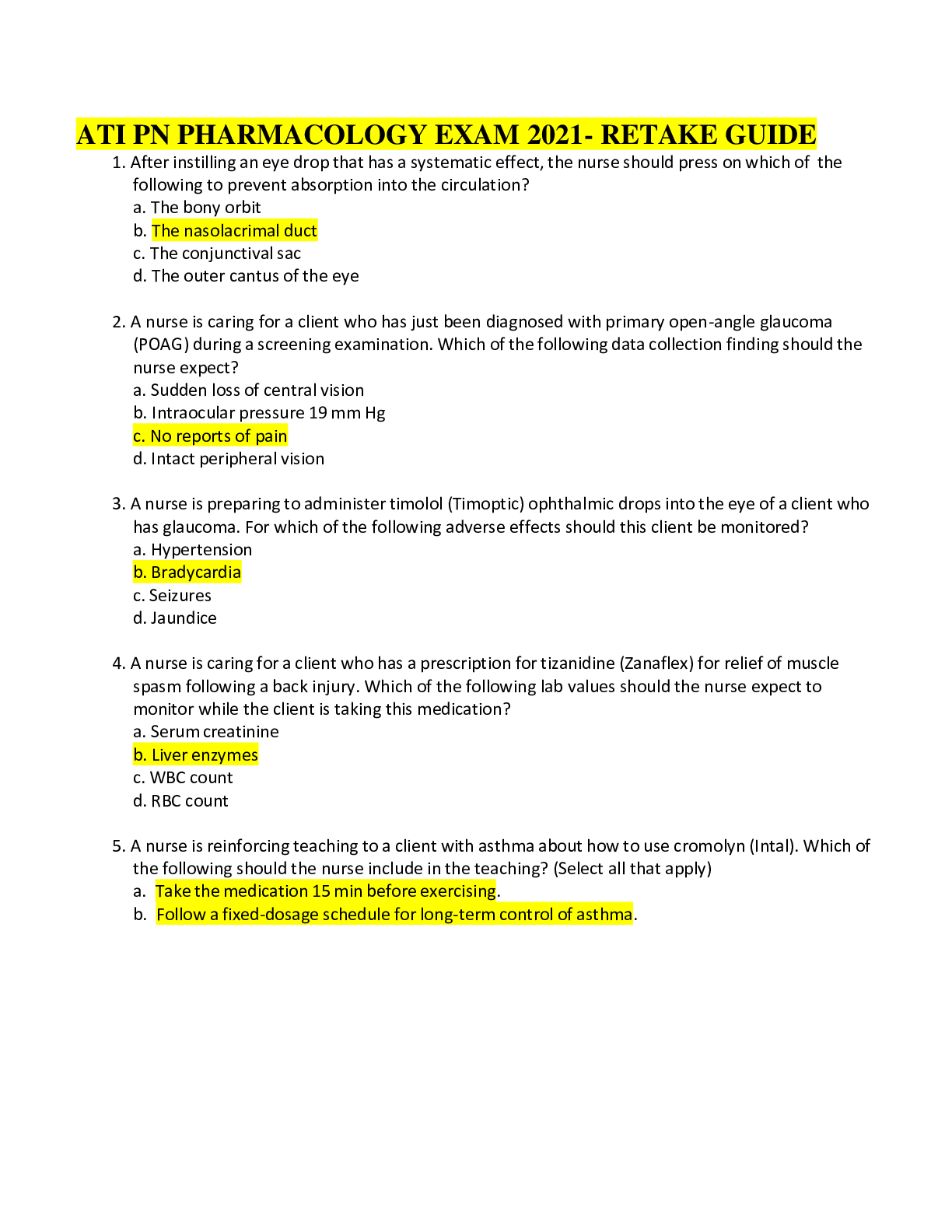
Reviews( 0 )
Document information
Connected school, study & course
About the document
Uploaded On
Feb 24, 2022
Number of pages
15
Written in
Additional information
This document has been written for:
Uploaded
Feb 24, 2022
Downloads
0
Views
120

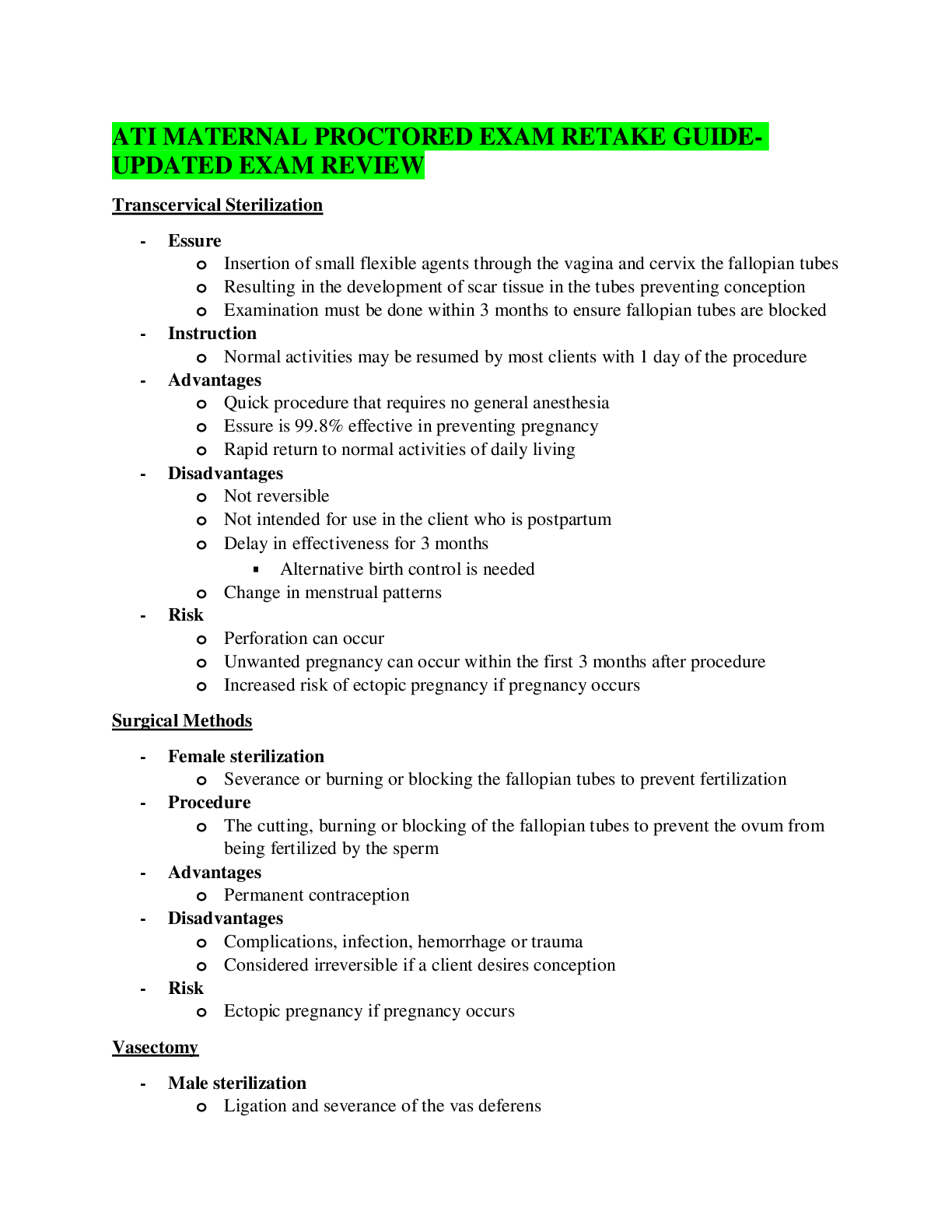



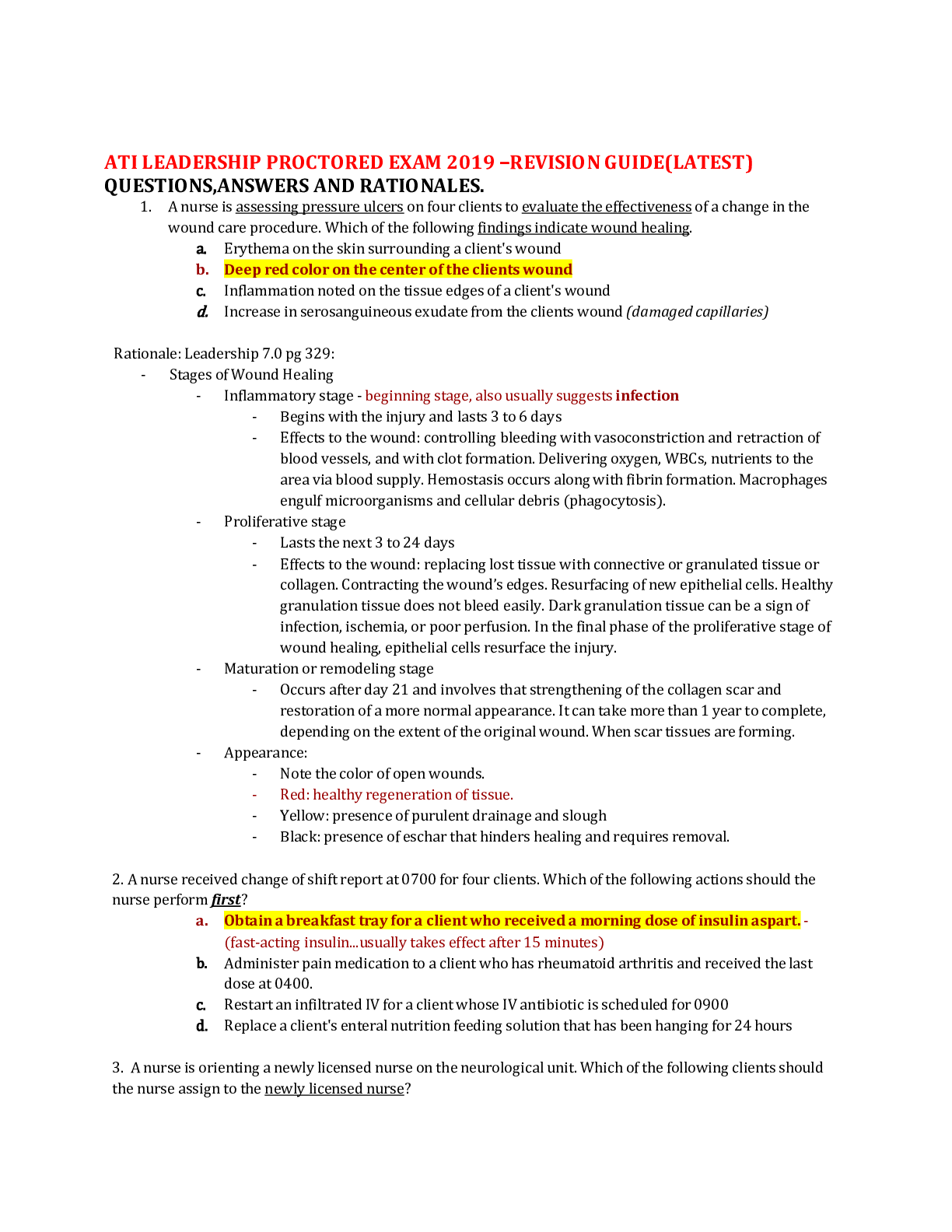
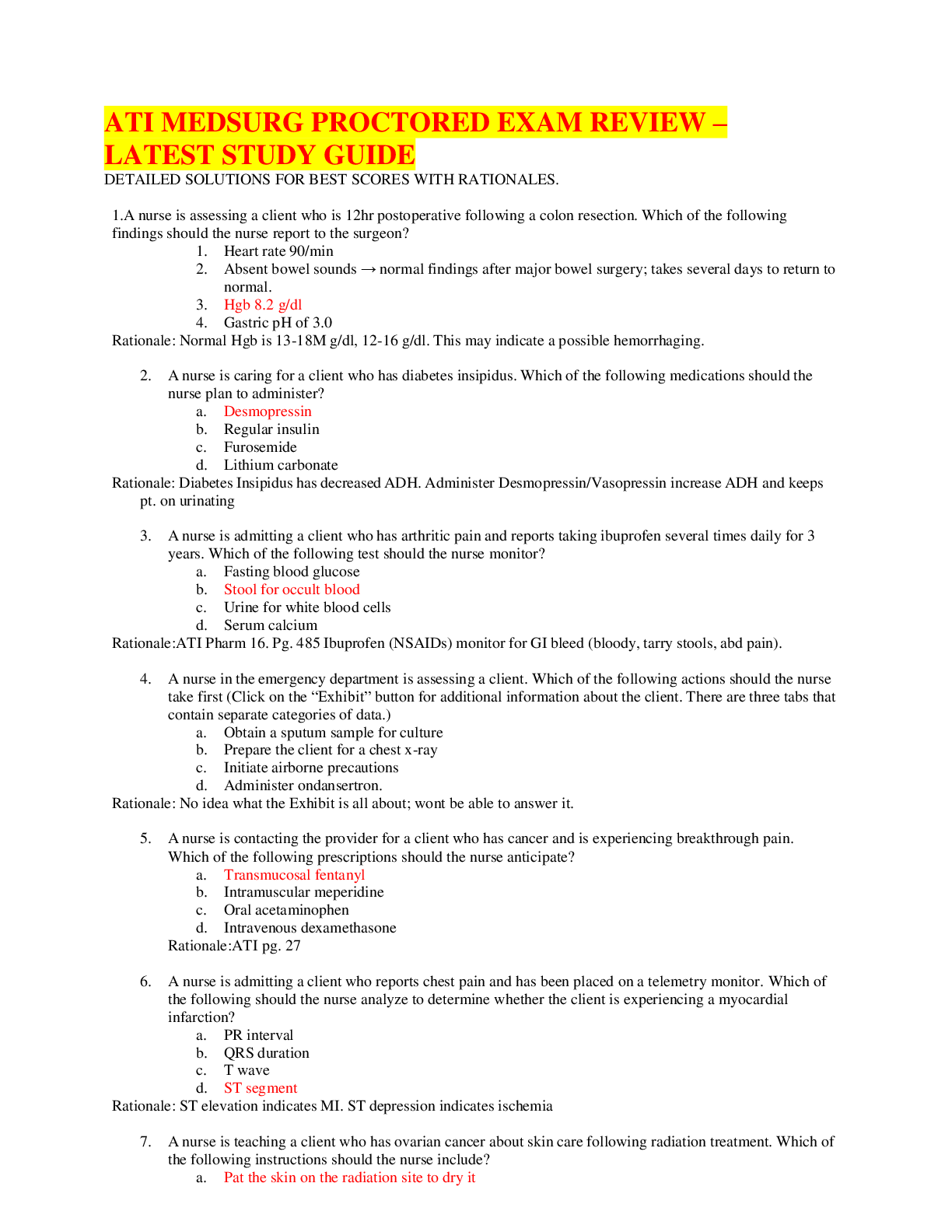
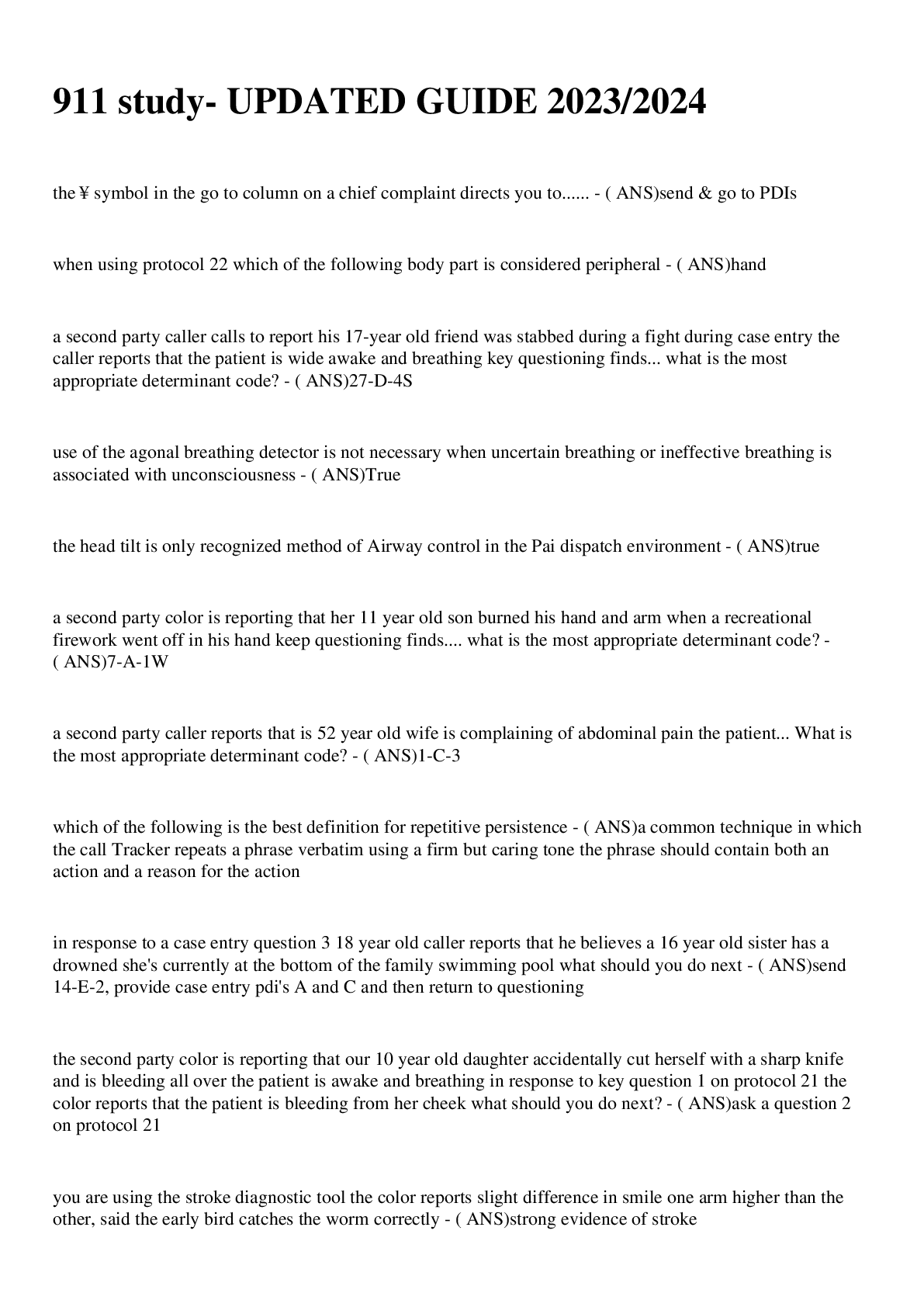

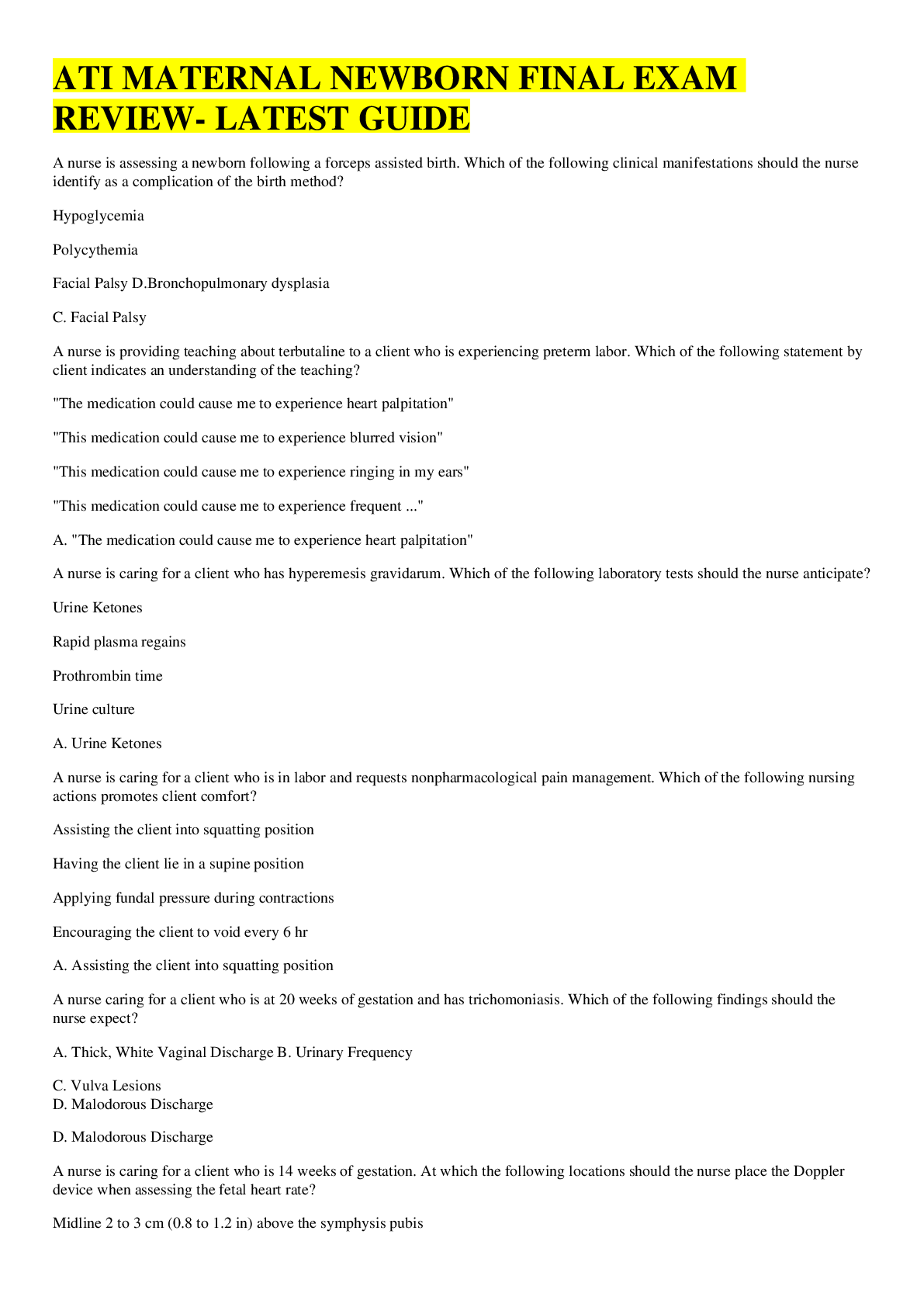
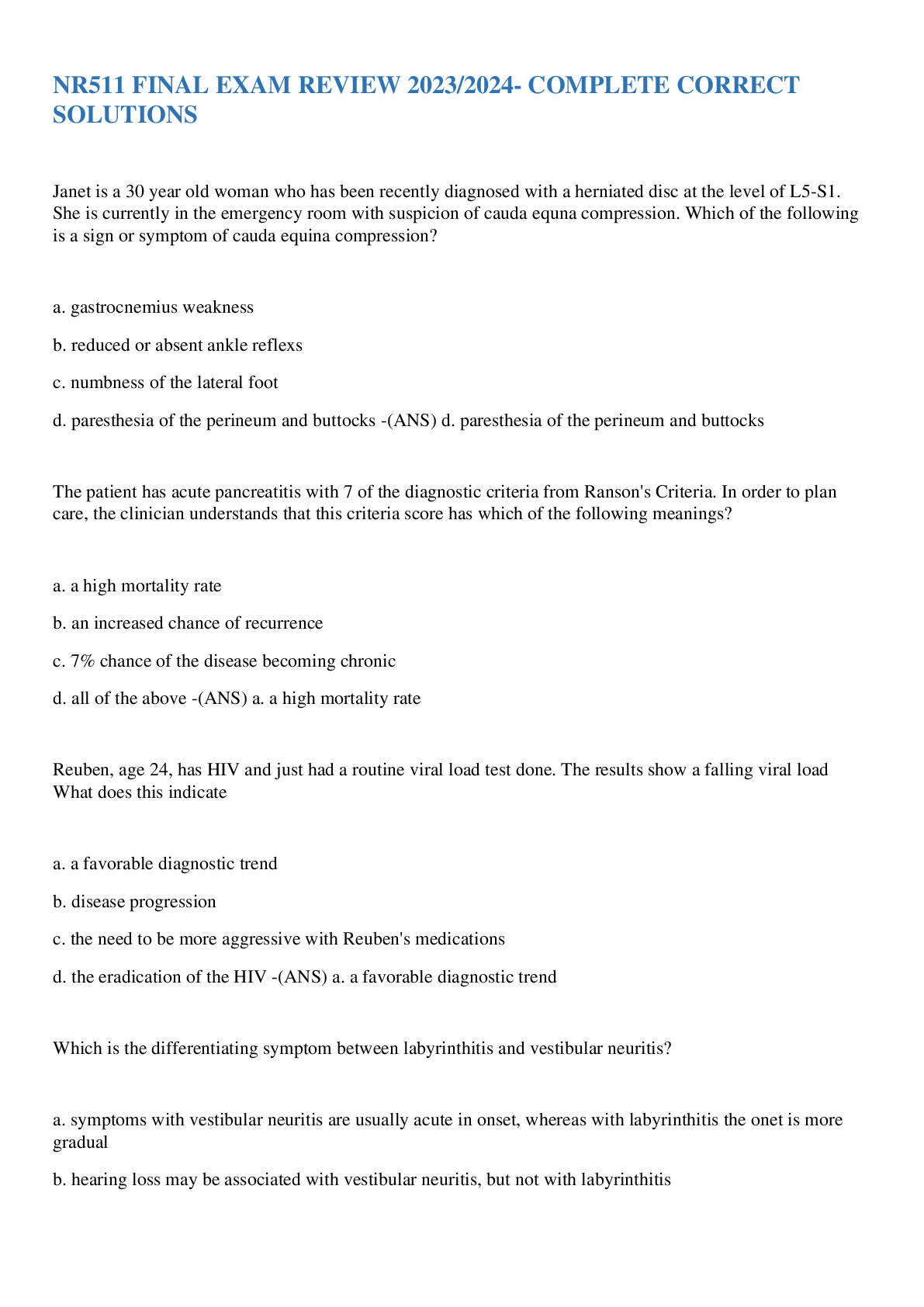


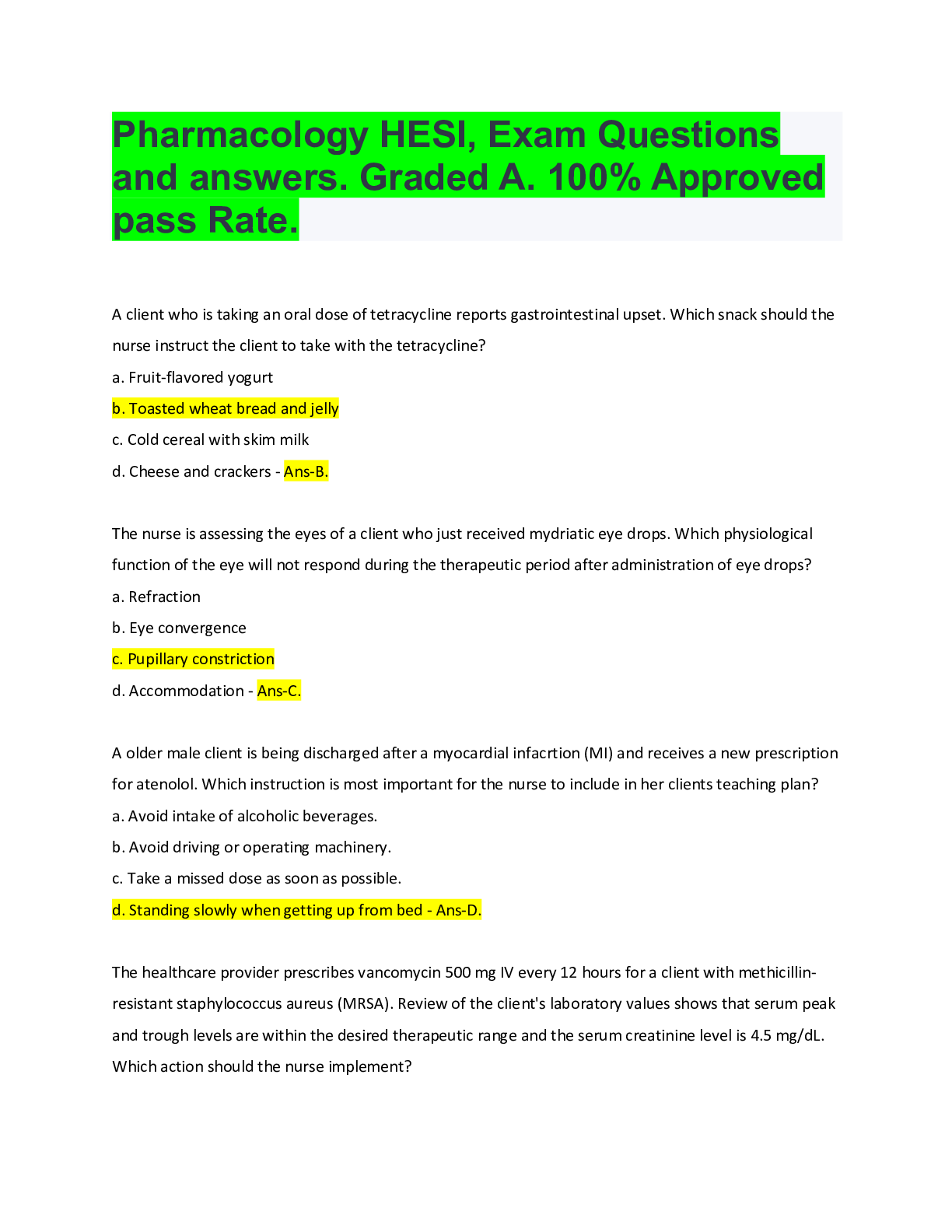

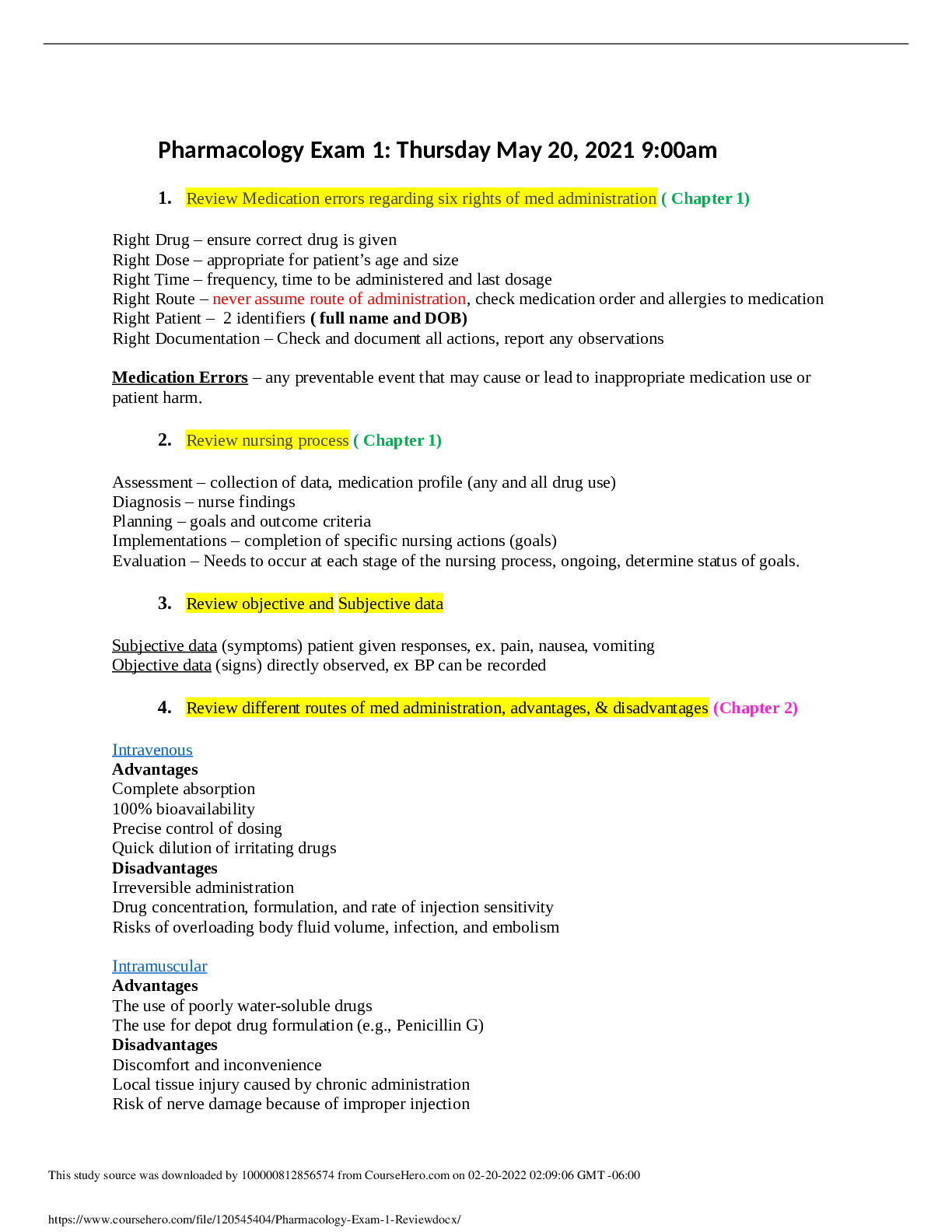
.png)
